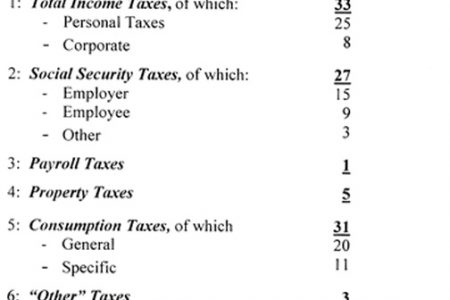
A National Assembly Budget Office is needed to restore trust in official economic data
In last week’s Sunday column, I had indicated my plan is to link last year’s analysis of the 2011 National Budget with my evaluation of this year’s.

In last week’s Sunday column, I had indicated my plan is to link last year’s analysis of the 2011 National Budget with my evaluation of this year’s.

Introduction Today I start my usual extended commentary on the annual Budget.

Introduction For now this is my last column in the series considering tax reform, following President Ramotar’s appointment of a Tax Reform Committee ― the first significant policy initiative of his administration.

Introduction I trust that there is no ambiguity whatsoever in the minds of readers as regards my opinion of the four traditional or standard goals of taxation, which I introduced in last week’s column (raising revenue; reducing income and wealth inequalities; politically facilitating stakeholder representation in the tax regime; and altering relative prices of goods and services in order to reward-punish economic choices).

Introduction Among other things, in the previous eight Sunday columns of this series on tax reform I have sought to establish three broad propositions.

Introduction Last week I started a discussion on the notion of tax fairness and equity, which I indicated is an essential feature for all well-functioning tax systems and thus tax reform in Guyana.

Introduction So serious are the defects in our tax regime I do not believe that Guyanese will be fobbed with anaemic or banal recommendations from the Tax Reform Committee.

Introduction Last week’s column briefly examined four of the nuts and bolts considerations which inform tax reform, namely, tax expenditures; tax level and structure; tax buoyancy and elasticity; and tax volatility.

Introduction Last week I claimed the value of taxes not paid in 2010 but which ought to have been paid under the tax code was roughly equivalent to that actually paid ($102 billion).

I have tried to make it clear that my treating with tax reform in my current columns has been deliberate.

Introduction The mindset of five major groups of stakeholders to the tax reform process (individual taxpayers; the law-making authorities; the public at large as beneficiaries of government spending; the tax administration authorities; corporate and other business taxpayers; as well as organisations like unions, farmers’ organisations, consumer groups and professional associations interested in greater transparency, fairness and efficiency in the tax system) have been briefly described in my two previous columns.

Introduction There is considerable irony to the fact that, as I pointed out last week, less than six months after the Poverty Reduction Strategy Paper (PRSP 2011-15) had highlighted the ongoing Tax Reform Action Plan (TRAP) in force since 2003 as a “tremendous success,” the incoming minority PPP/C administration, in one of its very first deliberate post-elections economic policy actions in December 2011, has established a Tax Reform Committee!

Part I Introduction Beginning last December 4, 2011 my Sunday columns have been re-visiting the global economic and financial crisis that erupted four years ago in light of two basic considerations.

Introduction At the end of 2010 I was expecting global economic recovery, albeit at a reduced rate, to take place during 2011.

Introduction One year ago (November 2010), the 42nd Annual Regional Monetary Studies Conference hosted by the Central Bank of Trinidad and Tobago paid tribute to my research in the field of money and finance.

Introduction In last week’s column I completed a brief description of the ten most important channels through which the negative effects of the global financial crisis and economic recession, which erupted in 2008 impacted Guyana and Caricom.

Introduction Last week’s column indicated that, during the coming weeks, I would be assessing the present state of the global crisis, which began in 2008.

Retrospect When I was first invited by the then Editor-in-Chief David de Caires about a decade ago to write a regular Sunday column for the Stabroek News, which would focus on locating Guyana’s situation in the context of regional and international developments, I readily agreed to undertake this task.

Unconditional, uncapped, untaxed Present official estimates show that more than one in three Guyanese are so poor that such persons regularly have to subsist on less than G350 or US$1.75 per day.

Introduction Last week’s column looked at the intrinsic double-dealing and its associated opportunism, which drives the low carbon development strategy (LCDS) and the Memorandum of Understanding (MOU) between the Government of Guyana and Norway signed in 2009.
The ePaper edition, on the Web & in stores for Android, iPhone & iPad.
Included free with your web subscription. Learn more.